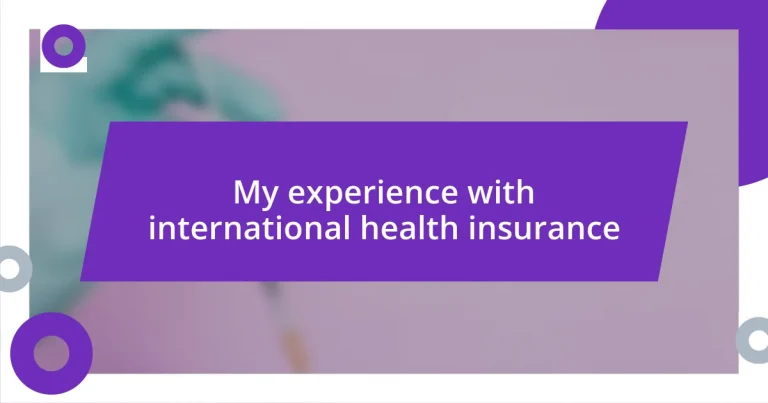Key takeaways:
- Understanding international health insurance is crucial for expatriates, as policies cover both emergencies and routine care tailored to one’s lifestyle.
- Choosing the right provider involves assessing coverage details, global networks, customer service, claim limits, and exclusions to ensure comprehensive support.
- Maximizing your policy relies on familiarizing yourself with coverage specifics, utilizing preventive care options, and regularly reviewing the policy to adapt to changing needs.
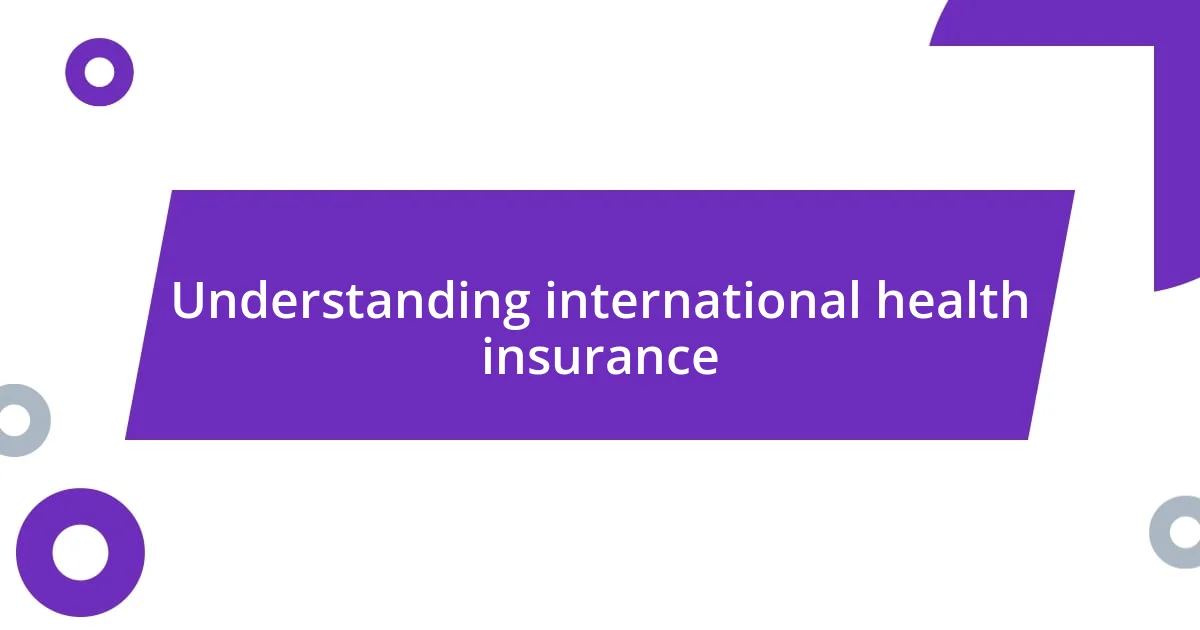
Understanding international health insurance
International health insurance can feel overwhelming, especially for someone like me who had little exposure to it before needing it. When I moved abroad, I remember staring at plans and benefits that seemed like a new language. It’s key to understand that these policies are designed not just for emergencies but also for routine care, offering a safety net in a foreign land.
One thing that caught me off guard was the difference in coverage based on location. For instance, I learned the hard way that a major hospital in one country might not be considered in-network in another, leading to unexpected out-of-pocket expenses. Have you ever considered how easily medical costs can spiral out of control? I certainly did after my first doctor’s appointment abroad, which wasn’t just a check-up but a serious wake-up call about navigating health care outside my home country.
As I delved deeper into my policy, I discovered various options tailored for expatriates, like evacuation coverage and telemedicine services. These features not only provided me peace of mind but also made me appreciate the importance of choosing a plan that aligns with my lifestyle. It made me wonder—what if I hadn’t taken the time to understand these nuances? The realization that comprehensive international health insurance is more than just a safety net; it’s a crucial part of living and thriving overseas truly hit home.

Reasons to get health insurance
It’s easy to overlook the importance of health insurance, particularly when we feel healthy. However, during my time living abroad, I quickly learned that unexpected medical emergencies can arise at any moment. I remember fainting one evening during a routine errand; thankfully, my insurance covered the hospital visit. Without it, I would have faced hefty bills and stress that certainly would have compounded my worries in an unfamiliar environment.
Another reason to invest in health insurance is the accessibility of quality healthcare. I once encountered a situation where a local clinic recommended a specialist for a procedure, and I was relieved to find that my policy covered it fully. This not only saved me money but also spared me the anxiety of searching for care independently. It made me realize that insurance can be a lifeline, connecting me to necessary healthcare services without the burden of immense costs.
Finally, robust health insurance provides comprehensive mental health support, which is often overlooked. After relocating, I felt the weight of homesickness, and seeking therapy helped me navigate those emotions. Knowing that my health plan offered mental health services alleviated a lot of fears and ultimately contributed to my overall well-being and ability to adapt. This kind of coverage isn’t just a safety net; it’s a bridge to thriving in a new community.
| Aspect | With Health Insurance |
|---|---|
| Emergency Coverage | Fully covered for unexpected events |
| Access to Specialists | Hassle-free connections and savings on costs |
| Mental Health Support | Access to therapy and support to manage relocation stress |
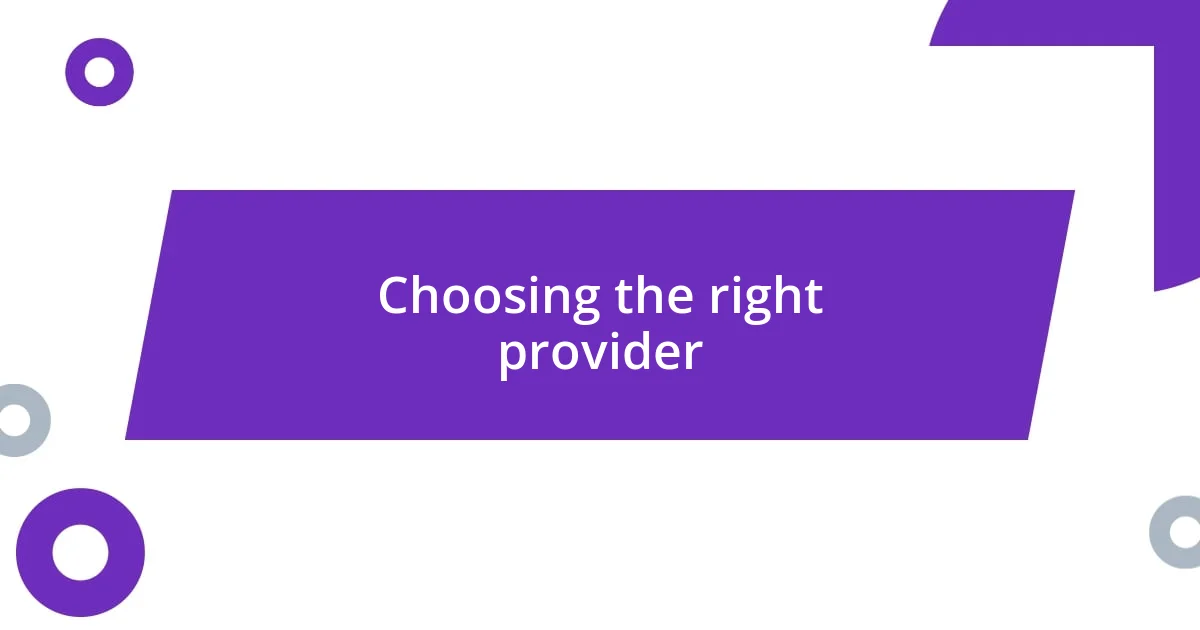
Choosing the right provider
Choosing the right provider for international health insurance is crucial, and I’ve found that it’s easy to get lost in the myriad of choices. When I was searching for my plan, I realized that I needed to prioritize what mattered most to me. For instance, I wanted a provider with a strong network in the countries I frequently visited, ensuring that I wouldn’t be caught off guard with out-of-network fees. The process felt daunting at times, but asking the right questions helped narrow my options.
Here are the key factors to consider when selecting a provider:
- Coverage Details: Look for plans that include both emergency and routine care to ensure comprehensive support.
- Global Network: Check the provider’s network in the countries you plan to visit or move to—this can prevent unexpected costs.
- Customer Service: Read reviews or ask expats about their experiences; a responsive provider made all the difference in my moments of need.
- Max Claim Limits: Understand the limits on claims to avoid any unpleasant surprises when you need to file one.
- Exclusions: Dive into the fine print and be aware of what’s not covered; I wish I had scrutinized this more carefully during my initial search.
Through my own experience, I realized that my peace of mind was worth the effort I put into this decision. A well-chosen provider can make navigating healthcare while living abroad a lot less stressful.
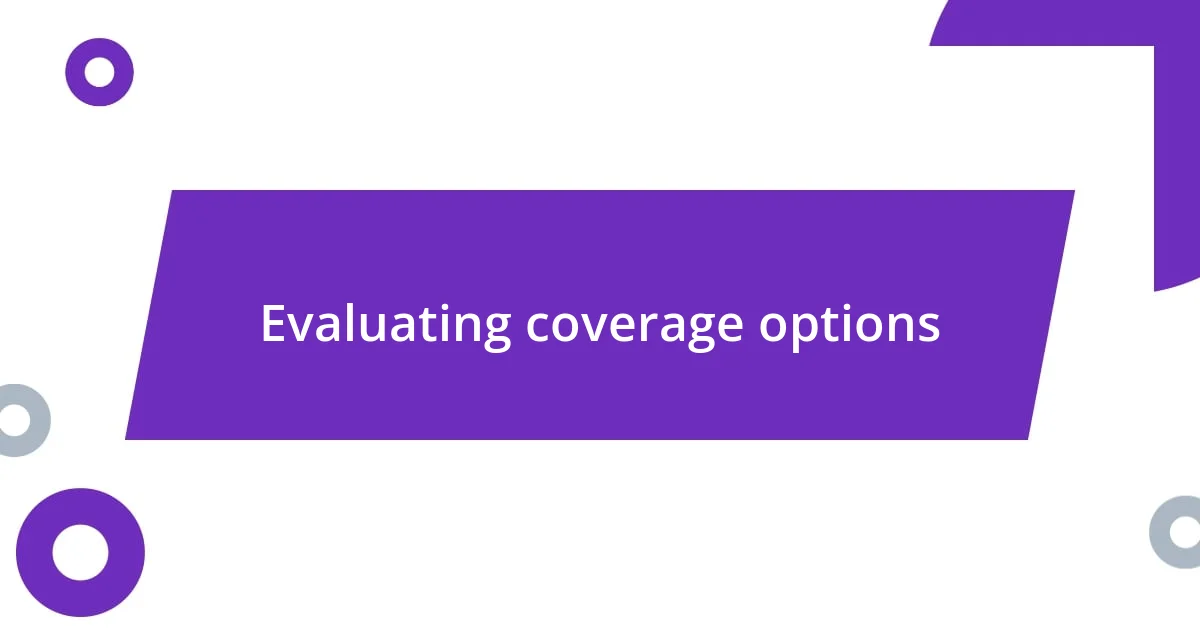
Evaluating coverage options
When evaluating coverage options, it’s essential to look beyond the basic plans. I remember sifting through different policies and feeling overwhelmed by the jargon; terms like “deductibles” and “co-pays” seemed intimidating. I found it helpful to break down the specifics. For example, a plan might seem appealing with a low premium, but if the deductibles were sky-high, it wouldn’t suit my needs during a medical emergency.
Getting into the nitty-gritty of coverage details proved to be a game changer. I still recall a time when I dismissed a policy due to its cost, only to later discover it offered extensive maternity services, which was crucial for my family planning. At that moment, it hit me: coverage options aren’t just about the price tag but rather matching the plan with my anticipated healthcare needs. What might seem like a steal now could lead to substantial out-of-pocket expenses later if it doesn’t align with my situation.
Engaging with potential providers was particularly enlightening. During a discussion with an agent, I gained insight into their claims process—something I hadn’t considered until I heard a horror story from a fellow traveler who faced a tangled web of paperwork. It made me ponder: how quickly could I get help when I really needed it? Finding a supportive customer service team felt like a reassuring safety net, making my decision much clearer in the end.
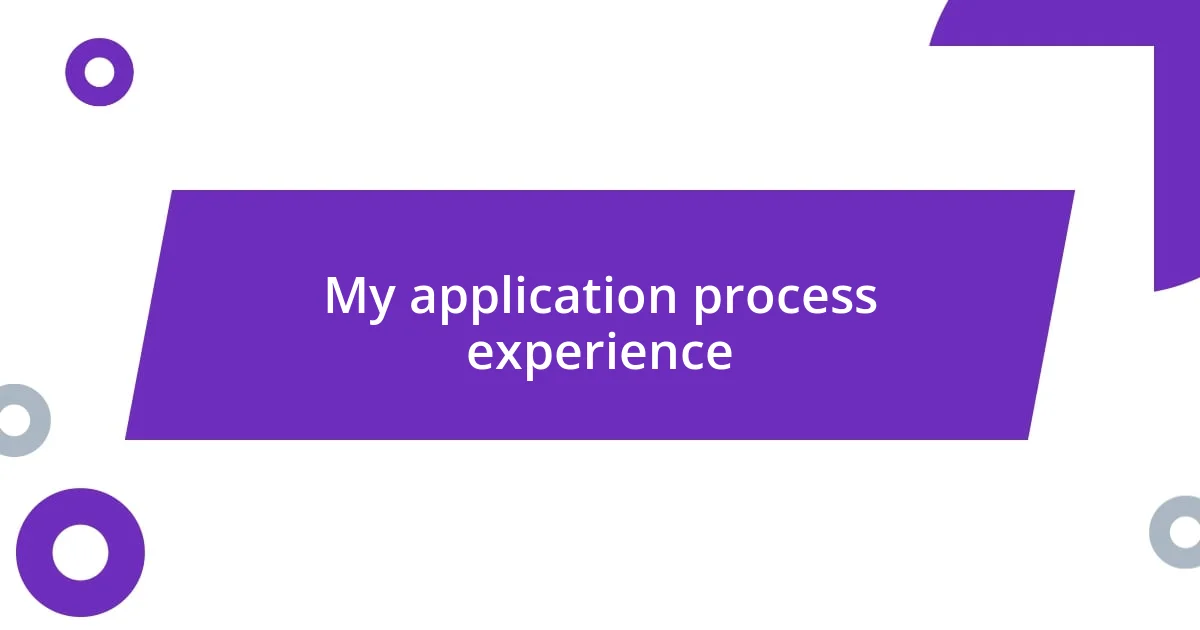
My application process experience
Once I decided to apply for my international health insurance, I was eager yet apprehensive about the paperwork. Sitting at my kitchen table, I remember staring at a two-inch stack of documents, feeling a mix of determination and anxiety. Did I really need all this information just to secure my health? The application process felt overwhelming at first, but breaking it into smaller steps made it more manageable. I started by filling out basic details, which gradually led me to more specific questions about my travel history and health conditions. Surprisingly, I found myself reflecting on my previous medical experiences, realizing how much I wanted to be covered in case of a sudden illness abroad.
As I entered the details about my previous surgeries and medications, I couldn’t help but question how thoroughly the provider would assess my application. Would they see me as just a number, or would they genuinely understand my healthcare needs? I still vividly recall the moment I hit “submit” – a mix of relief and nervous anticipation washed over me. That moment felt like releasing a deep breath I didn’t know I was holding. I had no idea how long the approval process would take, which only added to my anxiety.
When I finally received confirmation that my application was approved, I felt a significant weight lift. It was as if I had passed through a rite of passage, gaining not just insurance, but peace of mind. Reflecting on that experience, I realized that the application process isn’t just about crossing T’s and dotting I’s; it’s about securing your health and future in an unpredictable world. Do you ever wonder how much effort we put into protecting ourselves? My journey through the application process taught me that each detail matters and ultimately shapes our experience living abroad.
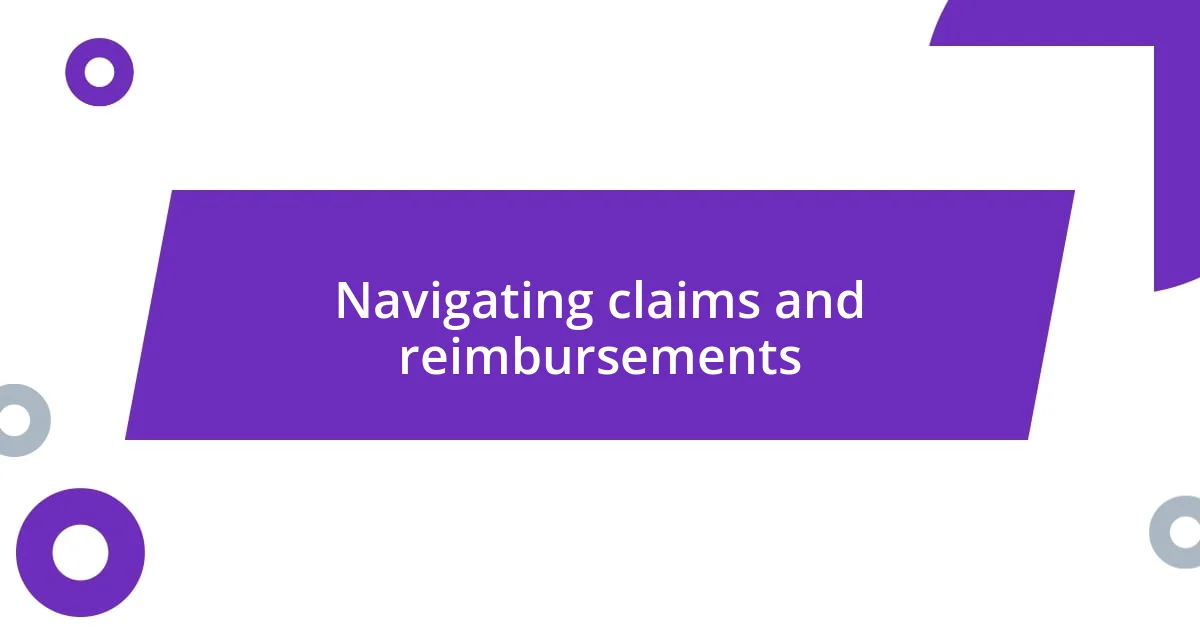
Navigating claims and reimbursements
Navigating claims and reimbursements with my international health insurance was quite the adventure—one that I didn’t anticipate would require as much finesse as it did. In one instance, after an unexpected trip to the emergency room, I found myself knee-deep in insurance forms, frantically searching for the right documentation. I remember pausing, feeling frustrated yet determined, thinking: was I really supposed to decipher this maze of paperwork when I was just recovering from an illness? It was a real test of patience, but I quickly learned that maintaining organized records made the process smoother.
What struck me most was the importance of understanding the nuances of reimbursement rates and timelines. After my first claim submission, I honestly expected a quick turnaround. Instead, I found myself anxiously checking my email for updates; it took much longer than I anticipated! Eventually, when the reimbursement finally arrived, it was almost a celebration in my household. That moment made me realize just how crucial it is to stay proactive—something I couldn’t have appreciated then but certainly do now. Have you ever had to wait for something essential, only to realize how much you needed to prepare in advance?
Reflecting on my journey, I also recognized the value of cultivating a strong relationship with the insurance provider. I reached out to their customer support with questions that could have easily been dismissed, but they answered every query with clarity and patience. Each interaction built my confidence in their system and made me feel more secure navigating the claims process. I learned that knowing the right points of contact and having an understanding of claim procedures could transform a stressful experience into a manageable one.
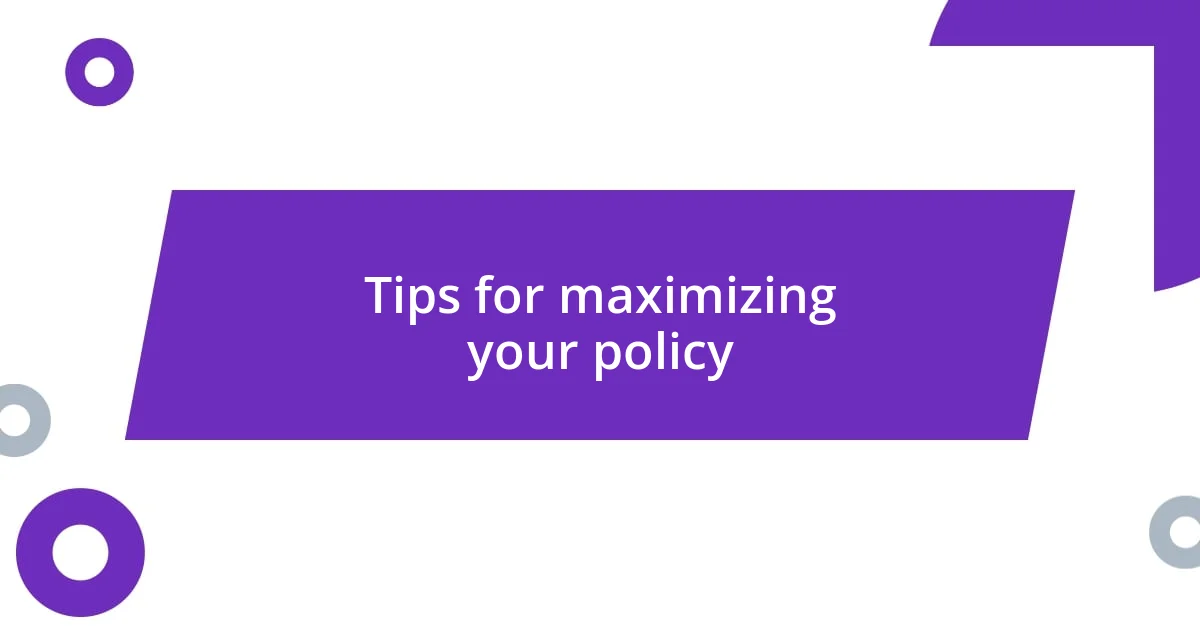
Tips for maximizing your policy
Maximizing your policy starts with familiarizing yourself with the details of your coverage. In my experience, I felt a bit overwhelmed at first, especially when reading through the fine print. But I quickly realized that understanding the exclusions and limitations was crucial. Did you know that many international health insurance policies don’t cover routine check-ups? By being proactive and knowing what to expect, I was able to plan my healthcare needs around what was actually covered.
One particular tip that worked wonders for me was utilizing preventive care options available under my policy. After a health scare last year, I had numerous consultations, and I learned that scheduling these regular check-ups not only kept me healthy but also ensured that I was making the most of my benefits. It’s almost like having a safety net; I felt more secure knowing I was actively managing my health. How many of us take a step back to evaluate the wellness resources available through our policies?
Lastly, I recommend regularly reviewing your policy to keep it relevant to your current needs. Life changes, such as relocating or starting a new job, can impact your healthcare requirements. When I moved to a new city, I made it a priority to connect with my insurance provider to update my information and ensure I had access to local providers. This simple step made me feel more settled and empowered. Have you ever thought about how a quick check-in with your insurance provider could significantly improve your peace of mind?












